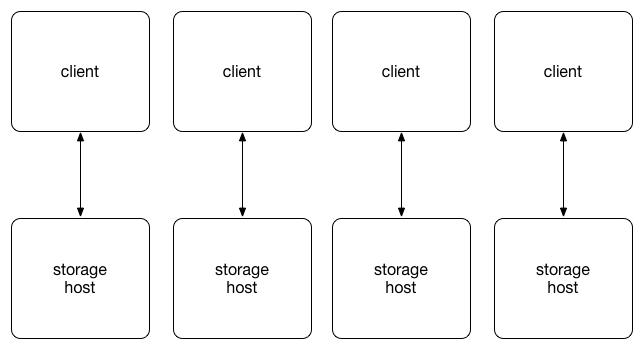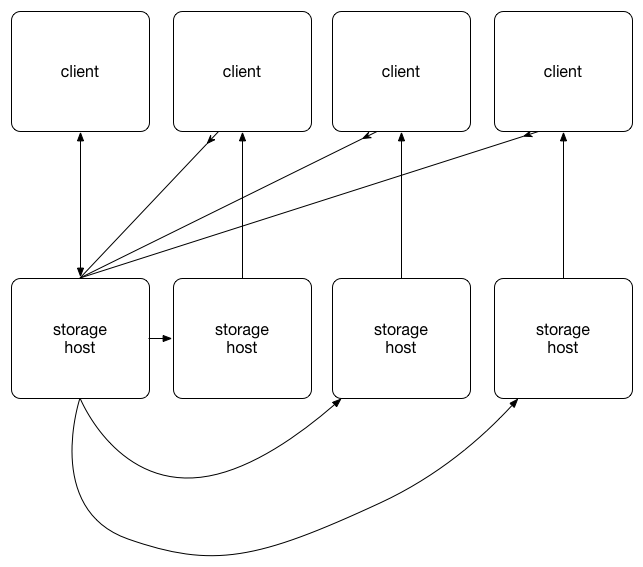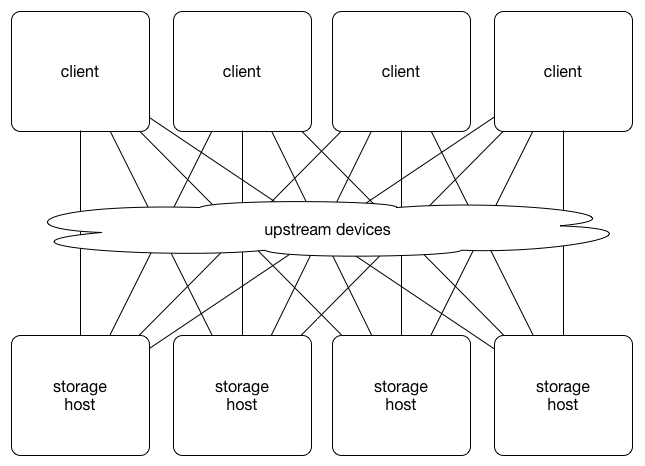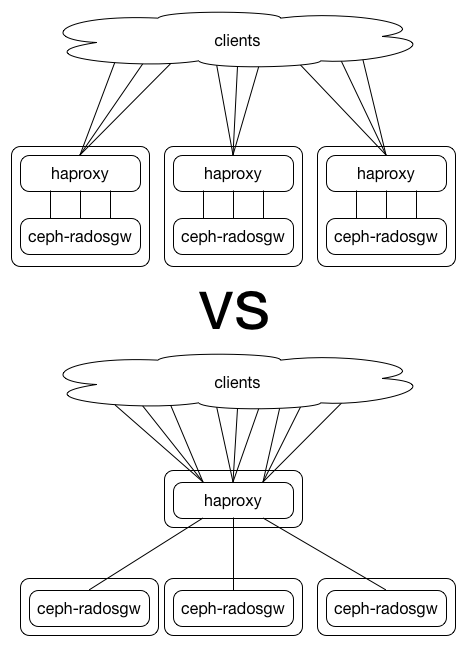Ceph Object Gateway is an object storage interface built on top of librados to provide applications with a RESTful gateway to Ceph Storage Clusters. Ceph Object Storage supports two interfaces:
- S3: compatible with a large subset of the Amazon S3 API
- Swift: compatible with a large subset of the OpenStack Swift API.
The objective of this ansible playbook is to present and help operators implement a few different traffic management scenarios for collections of Ceph Object Gateways. Each traffic management scenario is composed of two stages, a load balancing stage, and a proxy stage.
There are several options for balancing load across storage hosts. Operators should consider the traffic volume and fault tolerence required for their environment, while keeping in mind the complexity of their selected scenario.
The client_side_dns scenario configures a dnsmasq service on each client
that resolves the domain name for the object storage API endpoint to one of the
storage hosts. To balance the load across storage hosts, each storage host
should have the same number of clients. The mapping of storage hosts to clients
is configured with the vars/dnsmaq.yml variables file. The resulting
configuration is by no means fault tolerant and is only appropriate for lab
environments.
The vrrp_direct_route scenario configures keepalived on each storage host
with direct routing. The keepalived daemon runs on both active and passive
storage hosts. All storage hosts running keepalived will use the Virtual
Redundancy Routing Protocol (VRRP). The active storage host sends VRRP
advertisements at periodic intervals; if the backups routers fail to recieve
these advertisements, a new active storage host is elected.
Direct routing allows storage hosts to process and route packets directly to the requesting client rather than passing all outgoing packets through the active storage host. ARP requests for the virtual ip address are filtered by configuring arptables.
This solution is fault tolerant, but active/passive. It has the ability to scale egress beyond the throughput of a single host, but not ingress. This may make it unsuitable for environments that expect a large volume of object writes.
The route_health_inject scenario configures quagga on each storage host to
advertise a route to the /32 network of a virtual IP address bound to the
loopback interface. Upstream devices use hardware-based equal cost multipath
(ECMP) for load sharing across storage hosts. If quagga crashes or is stopped on
a storage host, the route will be withdrawn and it will stop recieving traffic.
Systemd can be employed to stop the quagga service if either the haproxy or
radosgw service crashes or stops.
This scenario requires upstream devices to be configured, and the required commands to configure will vary depending on the devices' network operating system. This makes this scenario more challenging to implement. On the other hand the resulting storage service is fault tolerant and active/active up to the ECMP width supported by upstream devices (commonly 32 or 64).
HAProxy is often used for balancing load across multiple backend servers. The role provided by this playbook does not use HAProxy for load balancing, but it does use a number of it's other features because they improve the robustness of Ceph Object Storage services. This is the only option we provide for the proxy stage.
Starting with the Firefly (v0.80) release of Ceph, the Ceph Object Gateway has ran on Civetweb. Civetweb is embedded into the ceph-radosgw daemon. This is in contrast with earlier releases that used the Apache webserver with FastCGI. One challenge with Civetweb is that it requires a thread per TCP connection. We have found that running HAProxy in front of ceph-radosgw helps in keeping the thread pool small while handling high connection counts. To make this work we keep connections between clients and HAProxy open, and close connections between HAproxy and ceph-radosgw after each HTTP request. This is accomplished with the http-server-close HAProxy configuration option.
There are only two SSL/TLS configurations that apply when http-server-close is employed. The configurations are SSL/TLS bridging/re-encryption or SSL/TLS offload.



